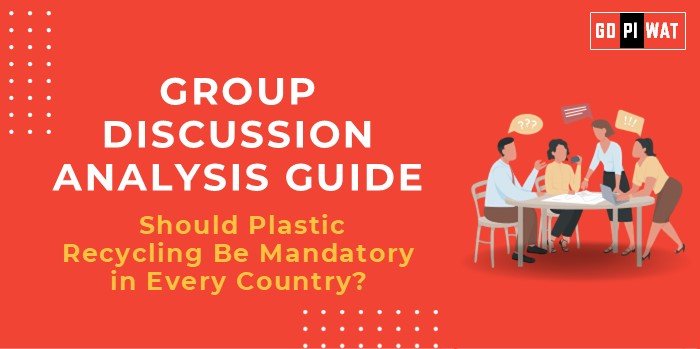📋 Group Discussion (GD) Analysis Guide: Should Plastic Recycling Be Mandatory in Every Country?
🌍 Introduction to the Topic
📖 Context Setting
Plastic waste has become one of the most pressing global environmental challenges, with over 400 million tons of plastic produced annually, only 9% of which is recycled. Making plastic recycling mandatory worldwide could significantly impact environmental health and economic sustainability.
📜 Topic Background
Plastic pollution stems from decades of dependence on single-use plastics and inadequate waste management systems. Countries like Germany and South Korea have excelled in recycling, achieving rates above 60%, while others lag far behind. The discussion on mandatory recycling encompasses environmental, economic, and logistical aspects.
📊 Quick Facts and Key Statistics
- 🌍 Global Plastic Production: 400+ million tons/year – Highlights the scale of the problem.
- 🔄 Recycling Rates: Only 9% globally (2023) – Shows inefficiency in current systems.
- 🌊 Ocean Plastic Pollution: 11 million tons annually – Demonstrates environmental consequences.
- 💰 Economic Impact: $120 billion value lost annually due to unrecycled plastics (World Bank).
🤝 Stakeholders and Their Roles
- 🏛️ Governments: Implement recycling policies, invest in infrastructure, and enforce regulations.
- 🏢 Businesses: Innovate in recycling technologies and reduce virgin plastic use.
- 👥 Consumers: Adopt responsible consumption and segregation practices.
- 🌱 NGOs/IGOs: Advocate for change, monitor progress, and provide expertise.
🏆 Achievements and Challenges
✨ Achievements
- 🇩🇪 Germany: Recycling rates of 68% due to robust policies and citizen engagement.
- 🇰🇷 South Korea: Compulsory waste segregation and technology-led processes.
- ♻️ Circular Economy Models: Reduced reliance on virgin materials in industries.
⚠️ Challenges
- 💰 Cost: Recycling infrastructure requires substantial investment, unaffordable for many developing nations.
- 🤔 Behavioral Barriers: Lack of awareness and non-compliance among consumers.
- 🔬 Technology Gap: Many countries lack advanced recycling technologies.
🌏 Global Comparisons
- 🇸🇪 Sweden: Converts over 99% of its waste into energy or recycled material.
- 🇮🇳 India: Informal recycling sector handles over 60% of plastic waste but lacks regulatory oversight.
📚 Case Studies
- 🌆 Mumbai, India: Ban on single-use plastics boosted recycling but faced enforcement challenges.
🗣️ Structured Arguments for Discussion
- ✅ Supporting Stance: “Mandatory recycling will reduce plastic pollution and conserve resources.”
- ❌ Opposing Stance: “High costs and technological gaps make mandatory recycling impractical for developing nations.”
- ⚖️ Balanced Perspective: “Mandatory recycling is essential, but it requires tailored approaches for developed and developing nations.”
🎯 Effective Discussion Approaches
- 📊 Opening Approaches:
- 🌍 Start with global recycling statistics to set the scale of the issue.
- ✨ Highlight case studies like Germany or Sweden to inspire solutions.
- 🔄 Counter-Argument Handling:
- “Addressing costs: Innovative public-private partnerships can reduce the financial burden.”
- “Technology sharing programs can bridge gaps for developing nations.”
🔍 Strategic Analysis of Strengths and Weaknesses
- 💪 Strengths: Conserves resources, reduces carbon emissions, and creates jobs in the recycling sector.
- 🤔 Weaknesses: High costs for low-income countries, dependence on consumer compliance.
- 🚀 Opportunities: Innovation in recycling technologies, potential for global alliances and funding.
- ⚠️ Threats: Resistance from industries reliant on virgin plastics, potential increase in black-market waste handling.
🎓 Connecting with B-School Applications
- 🌱 Real-World Applications: Study supply chain transformations due to recycling mandates in industries like packaging and FMCG.
- 📝 Sample Interview Questions:
- 💬 “How can developing countries overcome barriers to recycling?”
- 💬 “Evaluate the role of recycling in achieving net-zero targets.”
- 💡 Insights for B-School Students:
- Understand the economics of the circular economy.
- Explore waste-to-energy business models.


